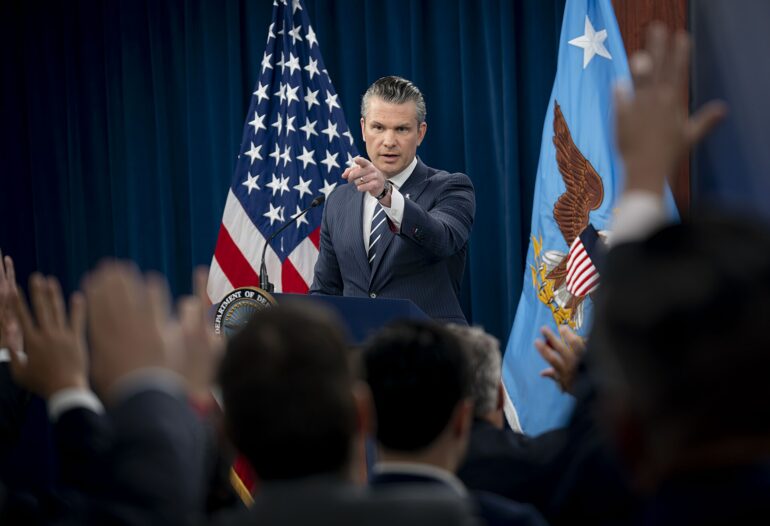A growing list of major media organizations, including The New York Times, The Washington Post, The Wall Street Journal, and CNN, reportedly said they will not agree to the Defense Department’s new policy limiting journalists’ communication with military personnel — a move that has sparked a broader debate over government transparency and the role of the press in covering national security.
The policy requires reporters to sign a document agreeing to new restrictions on how they can interact with Defense Department employees.
Those who refuse must surrender their Pentagon press badges and will not be issued new ones. For decades, accredited journalists with identification badges had wide access to nonclassified areas of the Pentagon, where they could walk the hallways and meet freely with officials.
That access was curtailed earlier this year, and the new policy further tightens those limits.
Under the new rules, military personnel must obtain official approval before sharing information with the press, even when the information is not classified.
The policy also warns that service members could face “adverse consequences for unauthorized disclosures,” and asserts that asking them to commit “criminal acts” by disclosing such information is not protected under the First Amendment.
Critics, including press-rights advocates and major outlets, have condemned the move as an overreach that undermines the public’s right to know. “This policy gags Pentagon employees and threatens retaliation against reporters who seek out information that has not been preapproved for release,” said the Pentagon Press Association, which represents more than 100 journalists. The group noted that no other major federal agency — including the White House or State Department — imposes such signing requirements on the press.
Defense Secretary Pete Hegseth, a longtime media critic and former Fox News host, appeared to mock the outlets’ objections on social media Monday, responding to their announcements with a simple goodbye handwave emoji.
He shared statements from The New York Times, The Atlantic, and The Washington Post declaring that they would not sign the new policy, adding no further comment.
The dispute is the latest flashpoint in the Trump administration’s broader reorganization of press access and credentialing. Earlier this year, the White House reshuffled the seating chart in the briefing room, granting new positions to what it calls “new media” outlets, including podcasters and smaller digital platforms.
Some major news organizations, such as the Associated Press and The Wall Street Journal, have also been barred from select White House events.
The Defense Department earlier removed office space for several traditional outlets — including NBC News, The Hill, CNN, and The New York Times — and reassigned them to outlets that have provided favorable coverage of the Trump administration, such as One America News Network, Breitbart, and the New York Post. Officials described the change as part of a “rotation program,” though reporters have called it punitive.
Hegseth himself has faced controversy for sharing sensitive military information in unsecured group chats earlier this year, while simultaneously accusing others of leaking classified material. He has been open about his distrust of the mainstream media, saying they have distorted the administration’s work and undermined public confidence in the military.
In response to widespread backlash, the Pentagon revised portions of the new policy after consultations with the Pentagon Press Association, the Reporters Committee for Freedom of the Press, and various news organizations. However, many editors said the revisions did not sufficiently protect their ability to report freely.
Reporters have until Tuesday to sign the agreement or lose access to the building by Wednesday. Some outlets, including conservative publications like the Washington Times and Newsmax, have also expressed opposition, calling the requirements “unnecessary and onerous.”
The standoff underscores a larger tension between the Trump administration’s efforts to enforce message discipline and the press’s insistence on transparency within the nation’s most powerful military institution — a confrontation that now threatens to reshape how Americans receive information about their own defense establishment.
[READ MORE: Vance Rebukes Stephanopoulos Over ‘Fake Scandal’ as Shutdown Drags On]



